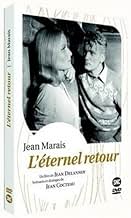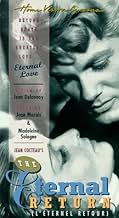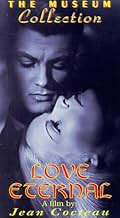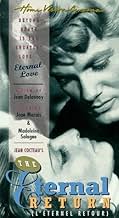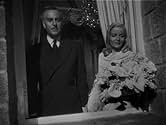NOTE IMDb
7,2/10
664
MA NOTE
Un jeune homme connaît un tragique coup du sort après être tombé amoureux de sa tante. Version moderne du mythe de Tristan et Yseult.Un jeune homme connaît un tragique coup du sort après être tombé amoureux de sa tante. Version moderne du mythe de Tristan et Yseult.Un jeune homme connaît un tragique coup du sort après être tombé amoureux de sa tante. Version moderne du mythe de Tristan et Yseult.
Avis à la une
10clanciai
This is perhaps the greatest love story ever brought to us from the darkness of the depths of the Middle Ages, and as the poet he is, Jean Cocteau has made his own poem about it and transferred it to the cinema. The amazing thing about this rendering of the timeless legend as that it is as modern and timeless as his one film "Orphée" seven years later, it could have been made and shot today, its settings can not be identified geographically, its special relationships could occur in any wealthy family, but there is one great difference: the introduction of the absolute evil by the dwarf Achille, who deliberately messes everything up from the beginning, and who delivers the love potion to the not yet awakened lovers on purpose in the belief that it is deadly poison. This is the stroke of genius in this version. Jean Delannoy the director has added to the character of this masterpiece by his own very romantic touch and extremely refined style in fascinating almost thriller-like cinematography all the way. Jean Marais makes one of his finest performances ever, although they are all outstanding, and Madeleine Sologne is over-fascinating in the mystery of her cool detachment changing into a voluntary martyrdom of passionate self-sacrifice. There are few more revolting villains in the history of cinema than this monster of a dwarf, who is entirely the product of a self-indulgent mother who just has spoiled him the more for being a monster. I have seen this film twice before, the first time almost 60 years ago, but its impact of timelessness remains the same and more convincing every time. There has been made a number of remakes of the legend in different settings and newly constructed stories, but this will probably remain the best of all, at least on the screen.
I see the Nazi references, but there are subtle subliminal messages being sent to the French people who were under the jackboot of Nazi oppression. It was not a proud time for them. Remember that during the Middle Ages, Vikings invaded France from the North. The men from the North who became the Normans finally assimilated nicely with the people living in northern France. Men who were expert sailors learned farming and the language of the "French". Re-telling the Tristan story always seemed to me to be a way to reach the soul of the French. It's a way to remind them of the time of the brave knight who comes to the rescue of his lady. The blondness of Patrice and Nathalie could be a reference to the Normans. They are both orphans of the sea and the death scene with both of them positioned perfectly on a boat(linked eternally)with the skies parting to bring them up to heaven is very reminiscent of the French epic poem "Chanson de Roland". It also reminds me of a dead Viking warrior being cast out to sea on his burning boat. A film to be enjoyed on many levels and a way to appease the Aryan loving Nazis while resonating with the proud history of the French.
Jean Cocteau's influence is indelible in this clever and sophisticated romance. Cocteau is at his most affecting when he adapts popular themes - in this case the Arthurian legend of Tristan and Isolde - and gives them a verisimilitude that challenges even modern sensibilities.
Patrice (Jean Marais) is a stunningly handsome young man who is supremely confident of his legacy. An orphan, his Uncle Marc clearly favors him over his cousin Achille (Pierre Perial), a malevolent dwarf who is as stunted morally as he is physically. Who can blame him? Achille is the son of Marc's wife's sister Gertrude (Yvonne de Bray) an eternally scheming, gossiping shrew who clearly has designs over Marc's fortune. Things come to a head after Patrice playfully sics his dog on Achille and Gertrude uses this incident to harass her brother-in-law. Marc agrees to let Patrice find him a young wife who would help him weather the strain of living with his no-good relatives, as well as revenge himself upon Gertrude for making his life as unpleasant as possible.
Patrice manages to find Nathalie, a orphan like himself, a beautiful foreigner who lives in constant fear of a drunken brute who threatens to marry, then eventually kill her. He comes to her rescue and when he proposes marriage, she is overwhelmed that the dashing Patrice has appeared - like some deus ex machine - offering her a way out of a mean and harrowing life, but not in the way she had hoped.
What astounded me about this film was how Cocteau was able to establish within a few scenes the tensions that underline the malevolence and envy of Marc and Patrice's dysfunctional in laws, Achille and Gertrude, roles which were marvelously acted. They never descend into hand-wringing caricatures because their evil is presented as something as arbitrary as their circumstances which, as Gertrude asserts and Marc himself acknowledges, are unfair. When these characters are away from the scene, the movie tends to lose its harrowing emotional depth. When other characters are introduced in the story, although these characters are also nicely fleshed out and wonderfully acted, you can't help but think that they would never hold a candle to Achille and Gertrude.
As for Patrice, you can't help but wonder at the way the blonde behemoth lights up the screen whenever he strides into the frame. But the film makers thankfully resisted the temptation to just make the character eye candy: despite being dashing and heroic, he can also be remarkably selfish, immature and casually cruel. I can't be sure if it's just bad subtitles but his callous treatment of Achille is cause for grounds. He takes digs at his cousin's deformity and despite claiming that his pet doesn't bite, he sics his dog on someone who isn't much larger than a child. Typical of his callousness is the way he dangles an impossibly wonderful life in front of the tragic, hapless Nathalie, only to make plain his real intentions later on. When she does accept his proposal, you wonder if it was because she had backed herself into a corner from which she couldn't hope to get out of. Hers was essentially a choice of the lesser evil: living in close proximity with a man whom she clearly loves but never being able to possess him, as opposed to living with a man whom she despises and threatens her harm.
When the film was released, the shining couple of the story was either held up as an example of the ideal pairing of male and female beauty, or as noxious pro-Aryan Nazi propaganda, and it CAN BE unsettling how so Nordic these two people are that their blondeness just leaps out and clubs you on the head despite the fact that the film is in black and white. It doesn't help that the final tableau and the opening frame of a giant hand cannot escape allusions to Nazi imagery - perhaps these were thrown in to help the movie get made. Yet it also made sense - for Patrice and Nathalie indeed look like they were made for each other (their common features and origins are explained) and the beauty that had marked them out for happy ever after begets the envy that eventually destroys them.
All in all, a film that deserves to be studied as seriously as the more landmark films in Cocteau's oeuvre.
Patrice (Jean Marais) is a stunningly handsome young man who is supremely confident of his legacy. An orphan, his Uncle Marc clearly favors him over his cousin Achille (Pierre Perial), a malevolent dwarf who is as stunted morally as he is physically. Who can blame him? Achille is the son of Marc's wife's sister Gertrude (Yvonne de Bray) an eternally scheming, gossiping shrew who clearly has designs over Marc's fortune. Things come to a head after Patrice playfully sics his dog on Achille and Gertrude uses this incident to harass her brother-in-law. Marc agrees to let Patrice find him a young wife who would help him weather the strain of living with his no-good relatives, as well as revenge himself upon Gertrude for making his life as unpleasant as possible.
Patrice manages to find Nathalie, a orphan like himself, a beautiful foreigner who lives in constant fear of a drunken brute who threatens to marry, then eventually kill her. He comes to her rescue and when he proposes marriage, she is overwhelmed that the dashing Patrice has appeared - like some deus ex machine - offering her a way out of a mean and harrowing life, but not in the way she had hoped.
What astounded me about this film was how Cocteau was able to establish within a few scenes the tensions that underline the malevolence and envy of Marc and Patrice's dysfunctional in laws, Achille and Gertrude, roles which were marvelously acted. They never descend into hand-wringing caricatures because their evil is presented as something as arbitrary as their circumstances which, as Gertrude asserts and Marc himself acknowledges, are unfair. When these characters are away from the scene, the movie tends to lose its harrowing emotional depth. When other characters are introduced in the story, although these characters are also nicely fleshed out and wonderfully acted, you can't help but think that they would never hold a candle to Achille and Gertrude.
As for Patrice, you can't help but wonder at the way the blonde behemoth lights up the screen whenever he strides into the frame. But the film makers thankfully resisted the temptation to just make the character eye candy: despite being dashing and heroic, he can also be remarkably selfish, immature and casually cruel. I can't be sure if it's just bad subtitles but his callous treatment of Achille is cause for grounds. He takes digs at his cousin's deformity and despite claiming that his pet doesn't bite, he sics his dog on someone who isn't much larger than a child. Typical of his callousness is the way he dangles an impossibly wonderful life in front of the tragic, hapless Nathalie, only to make plain his real intentions later on. When she does accept his proposal, you wonder if it was because she had backed herself into a corner from which she couldn't hope to get out of. Hers was essentially a choice of the lesser evil: living in close proximity with a man whom she clearly loves but never being able to possess him, as opposed to living with a man whom she despises and threatens her harm.
When the film was released, the shining couple of the story was either held up as an example of the ideal pairing of male and female beauty, or as noxious pro-Aryan Nazi propaganda, and it CAN BE unsettling how so Nordic these two people are that their blondeness just leaps out and clubs you on the head despite the fact that the film is in black and white. It doesn't help that the final tableau and the opening frame of a giant hand cannot escape allusions to Nazi imagery - perhaps these were thrown in to help the movie get made. Yet it also made sense - for Patrice and Nathalie indeed look like they were made for each other (their common features and origins are explained) and the beauty that had marked them out for happy ever after begets the envy that eventually destroys them.
All in all, a film that deserves to be studied as seriously as the more landmark films in Cocteau's oeuvre.
10QwikBall
I thought this film was genius. For this implicit portrayal of Nazi politics to be made in Vichy France is astounding. The sinister Achille is one of the most shockingly real characters I've ever seen. If you speak French, see this movie (do NOT rely on the subtitling...it's shoddy).
This movie was written by Jean Cocteau and it's pretty obvious due to the odd plot twists, romantic tone and mythological roots to the plot. Just a few years later, he was to BOTH write and direct Beauty and the Beast and Orpheus. These two are better films than The Eternal Return, though this movie is still worth watching--particularly as it shows and evolution of Cocteau's ideas. So, this movie is sort of like and unpolished version of these two later movies in many ways--particularly Orpheus. Absent from this film are the odd camera tricks but the story elements are all here.
The love between the two main characters is best described as a combination of the tragic stories of Orpheus and Eurydice along with Romeo and Juliet, but I have recently been informed that the story is ACTUALLY a reworking of the story of Tristan and Isolde. Thrown in for good measure are a malevolent dwarf, the dwarf's detestable parents and a lot of cool plot twists.
However, there were a few things that just didn't work out well in the movie. First, when it was obvious that the crazed dwarf had tried to kill the lovers by offering them what he thought was poison, nothing was done to punish him or place him in an institute for the criminally insane. This is pretty prudent considering what the dwarf does LATER in the story! Second, I hate movies that feature ladies fainting. Unless there is a blow to the head or they've gone without eating for a very extended period of time, people DON'T just faint. This is such a stupid cliché and I'm a little surprised that anyone as innovative and intelligent as Cocteau would resort to this device.
Other than that, it's a nice film.
FYI--An IMPORTANT warning: The video I watched was from The International Collection from Nelson Entertainment. If there are any OTHER companies that make this video, try them first!!!! The captioning was absolutely horrible!! Often, much of the dialog was not subtitled or very long statements were boiled down to one or two words!!! They showed very little respect for the integrity of the movie!
The love between the two main characters is best described as a combination of the tragic stories of Orpheus and Eurydice along with Romeo and Juliet, but I have recently been informed that the story is ACTUALLY a reworking of the story of Tristan and Isolde. Thrown in for good measure are a malevolent dwarf, the dwarf's detestable parents and a lot of cool plot twists.
However, there were a few things that just didn't work out well in the movie. First, when it was obvious that the crazed dwarf had tried to kill the lovers by offering them what he thought was poison, nothing was done to punish him or place him in an institute for the criminally insane. This is pretty prudent considering what the dwarf does LATER in the story! Second, I hate movies that feature ladies fainting. Unless there is a blow to the head or they've gone without eating for a very extended period of time, people DON'T just faint. This is such a stupid cliché and I'm a little surprised that anyone as innovative and intelligent as Cocteau would resort to this device.
Other than that, it's a nice film.
FYI--An IMPORTANT warning: The video I watched was from The International Collection from Nelson Entertainment. If there are any OTHER companies that make this video, try them first!!!! The captioning was absolutely horrible!! Often, much of the dialog was not subtitled or very long statements were boiled down to one or two words!!! They showed very little respect for the integrity of the movie!
Le saviez-vous
- AnecdotesParis box office: 10,511,384 French francs (11-1-1944).
- Versions alternativesThere is an Italian edition of this film on DVD, distributed by DNA Srl: "LES DAMES DU BOIS DE BOULOGNE (Perfidia, 1945) + L'ÉTERNEL RETOUR (L'immortale leggenda, 1943)" (2 Films on a single DVD), re-edited with the contribution of film historian Riccardo Cusin. This version is also available for streaming on some platforms.
- ConnexionsFeatured in Pink Ulysses (1990)
Meilleurs choix
Connectez-vous pour évaluer et suivre la liste de favoris afin de recevoir des recommandations personnalisées
Détails
- Durée1 heure 47 minutes
- Couleur
- Rapport de forme
- 1.37 : 1
Contribuer à cette page
Suggérer une modification ou ajouter du contenu manquant

Lacune principale
By what name was L'Éternel Retour (1943) officially released in India in English?
Répondre
